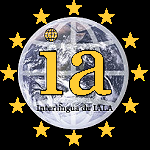
Back Аинтерлингва Abkhazian Interlingua Afrikaans Интерлингва ALT ኢንተርሊንጉዋ Amharic Interlingua AN Interlingua ANG إنترلنغوا Arabic ܐܝܢܛܪܠܝܢܓܘܐ ARC আন্তঃলিংগুৱা Assamese Interlingua AST
| Interlingua | |
|---|---|
 Logo | |
| Pronunciation | /ɪntərˈlɪŋɡwə/; IA: [inteɾˈliŋɡwa] |
| Created by | International Auxiliary Language Association |
| Date | 1951 |
| Setting and usage | Scientific registration of international vocabulary; international auxiliary language |
| Users | 1,500 (2000)[1] |
| Purpose | International auxiliary language
|
| Latin script | |
| Sources | Source languages: English, French, Italian, Portuguese, and Spanish, with reference to some other control languages (mainly German and Russian). |
| Official status | |
| Regulated by | No regulating body |
| Language codes | |
| ISO 639-1 | ia |
| ISO 639-2 | ina |
| ISO 639-3 | ina |
| Glottolog | inte1239 |
Interlingua is a constructed language using words that are found in most West-European languages. It was made by IALA - a group of people (the most known was Alexander Gode) who worked on it for more than 20 years, and they finished and published the first dictionary in 1951. Interlingua was created on the base of languages: English, French, Spanish, Portuguese, and Italian.
Inter is the same root word as in the words "interaction", "interface" and so on, and it means "between" or "to each other"; lingua means "language". They chose the name Interlingua because they wanted it to be used for people of different countries to talk to each other easily. Because Interlingua was made by people to be easy, it is easier than natural languages to learn. In the year 2000, the language could be spoken by 1,500 people. Interlingua speakers say that millions can understand it (read texts in it and listen to someone talk in it) without having to learn it first.
There are three other constructed languages in the world that have more than 1000 speakers, Esperanto, Ido, and Toki Pona.[2] Esperanto and Ido were made before Interlingua. Toki Pona was made in 2001. Some people think Esperanto and Ido are easy to learn because they have no exceptions (words that break the rules) but other people think Interlingua is easier because the makers chose all the words to be easy to understand for people who know English, French, Spanish, Portuguese, or Italian, plus languages like Occitan and Romanian, languages that used to be Latin, the language used in Rome a long time ago.
Actually, people who use Interlingua say that their language is actually new Latin, just simpler and modernized (made new).
- ↑ Sabine Fiedler, 1999, "Phraseology in planned languages", Language Problems and Language Planning, vol. 23 no. 2
- ↑ https://web.archive.org/web/20230706140833/https://iso639-3.sil.org/sites/iso639-3/files/change_requests/2021/2021-043_tok.pdf. Archived from the original on 2023-07-06. Retrieved 2023-08-05.
{{cite web}}: Missing or empty|title=(help)CS1 maint: bot: original URL status unknown (link)